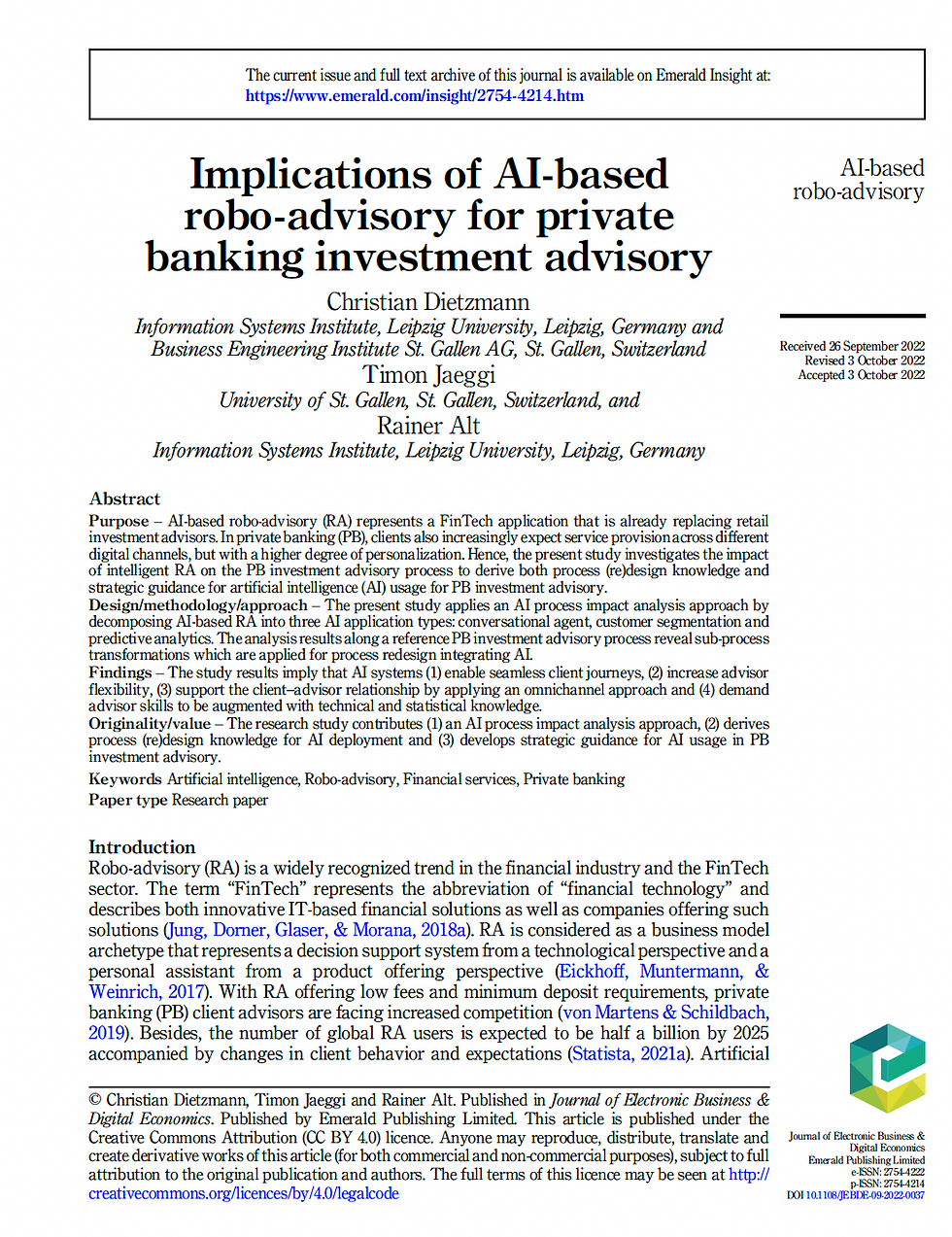The Swiss working world is changing: AI opens up opportunities and challenges for Switzerland (1/2)
- Timon Jaeggi
- Sep 14, 2023
- 4 min read
Welcome to our Blog Post exploring the paper 'Are Our Jobs at Risk? Estimating the Effect of Artificial Intelligence on the Swiss Labor Market,' which was previously presented at the Academy of Management conference in Boston. I'm Timon Jaeggi, one of the co-authors of this study.
In the not-so-distant past, computerization primarily targeted occupations characterized by repetitive, non-cognitive tasks. Early technologies, like rule-based computers, could efficiently replace roles defined by limited, well-defined responsibilities. This fostered the belief that humans would maintain their edge, especially in creative and cognitive domains.
But today, as we stand at the frontier of AI advancements, our study aims to shine a light on a rapidly evolving landscape. The maturation of AI technology has unveiled a complex interplay of strengths and weaknesses, leading to intricate and varied impacts on different job profiles. These developments challenge conventional wisdom and beckon us to dig deeper into how AI is reshaping our workforce.
In this blog post, we will unveil the diverse effects of AI on various sectors, considering both substitution (where humans are replaced) and complementarity (where humans are supported). We'll explore the potential benefits and challenges posed by AI, and discuss how policymakers can navigate this technological revolution to create a future that enhances human potential while addressing potential risks.
Our research had two overarching objectives to understand AI's impact on the Swiss workforce:
First, we delved into the effect of AI capabilities at the individual occupational level. To achieve this, we devised a novel method to quantify how each occupation faces exposure in the era of AI. This allowed us to pinpoint which occupations are particularly vulnerable to AI's influence. Our approach went beyond a broad stroke assessment and delved into the specific skills and abilities used in tasks that AI could potentially handle. We quantified individual exposure through three unique measurements: AI unaffectedness, AI complementarity, and AI substitutability. These measurements provided deep insights into how AI interacts with various tasks, identifying areas where AI complements human abilities, tasks where it is irrelevant, and those where it could potentially replace human labor.
Second, we turned our attention to exploring the macroeconomic impact of AI on selected sectors within the Swiss economy and employment. Through our analysis, we sought to gain a deeper understanding of how AI influences specific sectors and the resulting implications for employment dynamics. Furthermore, we delved into the relationship between AI exposure, wage levels, and educational attainment to uncover potential correlations and broader implications.
Data and methodology
For our analysis, we harnessed occupation-specific characteristics and country-specific data on Swiss employment and wages. We drew from the comprehensive O*NET database to gather information on occupation-specific attributes. As for data on Swiss wages and employment, we accessed the most up-to-date figures available from the Swiss Federal Statistical Office, ensuring the reliability of our data.
Our initial step involved selecting a subset of occupations for training data, encompassing various specific tasks inherent to each occupation. Subsequently, we manually labeled around 1,600 distinct tasks associated with these occupations, determining whether these tasks are subject to substitution or complementarity due to artificial intelligence, or if they remain unaffected by AI. To ensure objectivity in task categorization, we adopted a multi-review approach, involving AI researchers and practitioners for task validation.
Following this, we employed a supervised learning method to establish statistical relationships between an occupation's AI exposure and the skills and competencies necessary for its execution.
In the next phase, we extended our predictions of AI exposure to occupations beyond the initial sample, thus assigning a score to each occupation within the dataset.
To finally draw macroeconomic insights, we aggregated occupations into sectors and weighted them using Swiss employment figures, enabling us to make informed conclusions about potential macroeconomic repercussions.
Results at individual occupational level (micro level)
The outcomes at the micro level reveal an incredibly diverse profile of AI-vulnerable occupations. This diversity arises from the nuanced strengths and weaknesses of AI, making certain occupation-specific skills and competencies more suitable while rendering others less so. Importantly, AI can notably complement occupations that require advanced analytical skills and interpersonal interaction, such as compliance officers or management analysts. The results also underscore that the potential for AI substitution is most pronounced in occupations with lower demands for cognitive abilities like "originality," "fluency of ideas," or "learning strategies," as seen in roles like order clerks or proofreaders.

The insights at the micro level provide valuable understanding of how AI influences the requisites of individual occupations. They underscore that AI's impact isn't limited to job replacement; it also contributes to enhancing and augmenting certain aspects of work. These insights hold significance for both employees and employers, enabling them to prepare for and respond to the evolving landscape of work.
Through micro-level analysis, we contribute to gaining a better understanding of the diverse impacts of AI on various professions. We illustrate how skills and tasks within a profession can evolve in the context of AI integration. This is crucial for making well-informed decisions both at an individual and organizational level and for maximizing the opportunities presented by the AI revolution. At AI Spaces, we specialize in identifying and analyzing the individual impacts of AI on businesses, assisting them in successfully navigating the path into the AI era.
In our next blog post, we will examine the overall picture in Switzerland and address how these micro-effects influence the entire Swiss job market.










Comments